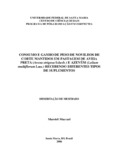| dc.creator | Maccari, Marcieli | |
| dc.date.accessioned | 2008-11-28 | |
| dc.date.available | 2008-11-28 | |
| dc.date.issued | 2006-02-20 | |
| dc.identifier.citation | MACCARI, Marcieli. Intake and weight gain of beef steers grazing oat
(Avena strigosa Schreb.) and ryegrass (Lolim
multiflorum Lam.) pasture under differents kinds of
supplements. 2006. 40 f. Dissertação (Mestrado em Zootecnia) - Universidade Federal de Santa Maria, Santa Maria, 2006. | por |
| dc.identifier.uri | http://repositorio.ufsm.br/handle/1/10720 | |
| dc.description.abstract | This work was carried out to evaluate the effect of different kinds of supplement on steers intake and weight gain when kept under pasture of ryegrass (Lolium multiflorum Lam.) plus black oat (Avena strigosa Schreb). Twelve steers were used, procceded of Nellore/Charolais crossing, with 18 months of age and initial live weight of 230 kg. Three animals groups received a different kind of supplement between which is included soybean meal (SM), corn gluten meal (CGM) and cassava meal (CM), and a group that only received pasture or control group
(CO). The grazing method was temporary grazing (5 hours), with variable stocking rate was used, to maintain 2,000 kg of dry matter/ha in herbage. For evaluates of the quality of the ingested it was carried through. For ingested pasture quality evaluation was realized hand plucking sample of grazing. In order to determine the intake, an external marker chromium oxide, in a daily dose of 10 g. There was no interaction betwen suplements and periods of
evaluation. Were evaluated the dry matter intake (DMI) total (pasture + supplementation) and of pasture by kg/day and by % of life weight, animal performance (kg/dia) in relation to the supplementation used and period of use. The animals showed average gains of live weight of
0.9; 1.1; 1.4 and 1.0 kg/animal/day for the supplements CM, SM, CGM and CO, respectively. The supplementation with SM and CM did not affect the dry matter (DM) intake from the pasture, but increased the total DMI, however the increase of the intake did not affect of weight gain. The best weight gain of the animals gotten with supplements of CGM it was folloied by the biggest DMI of the pasture and total | eng |
| dc.description.sponsorship | Coordenação de Aperfeiçoamento de Pessoal de Nível Superior | |
| dc.format | application/pdf | por |
| dc.language | por | por |
| dc.publisher | Universidade Federal de Santa Maria | por |
| dc.rights | Acesso Aberto | por |
| dc.subject | Aveia | por |
| dc.subject | Azevém | por |
| dc.subject | Ganho de peso | por |
| dc.subject | Consumo de pastagem | por |
| dc.subject | Suplementação | por |
| dc.subject | Oat | eng |
| dc.subject | Ryegrass | eng |
| dc.subject | Weight gain | eng |
| dc.subject | Intake pasture | eng |
| dc.subject | Supplementation | eng |
| dc.title | Consumo e ganho de peso de novilhos de corte
mantidos em pastagem de aveia preta (Avena strigosa Schreb) e azevém (Lolium multiflorum Lam.) recebendo diferenets tipos de suplementos | por |
| dc.title.alternative | Intake and weight gain of beef steers grazing oat
(Avena strigosa Schreb.) and ryegrass (Lolim
multiflorum Lam.) pasture under differents kinds of
supplements | eng |
| dc.type | Dissertação | por |
| dc.description.resumo | Este trabalho foi realizado para avaliar o efeito de diferentes tipos de suplemento sobre o consumo e ganho de peso de novilhos de corte mantidos em pastagem de aveia preta (Avena strigosa Schreb) e azevém (Lolium multiflorum Lam.). Foram utilizados 12 novilhos de corte, provenientes do cruzamento entre as raças Nelore/Charolês, com idade de 18 meses e peso vivo (PV) médio inicial de 230 kg. Três grupos de animais receberam um tipo diferente de suplemento entre os quais incluíam-se o farelo de soja (FS), o farelo de glúten de milho (FGM) e a farinha de mandioca (FM), além de um grupo que recebeu somente pastagem ou controle (CO). O método de pastejo foi horário (5 horas), com lotação variável, visando manter massa de forragem de 2000 kg/ha de matéria seca de forragem. Para avaliação da qualidade da pastagem ingerida foi realizada simulação manual de pastejo. O consumo da pastagem foi determinado utilizando óxido de cromo como marcador externo, em dose única diária de 10 g. Não houve interação significativa (P>0,05) entre suplementos e períodos de avaliação. Os animais apresentaram ganhos médios de 0,9; 1,1; 1,4; e 1,0 kg/animal/dia para os suplementos FM, FS, FGM e CO, respectivamente. A suplementação com FM e FS não alterou o consumo de pastagem, mas aumentou o consumo total de alimento, entretanto o aumento do consumo não se refletiu um aumento do ganho de peso. O melhor desempenho produtivo dos animais obtido com a suplementação de FGM foi acompanhado pelo maior
CMS da pastagem e total. | por |
| dc.contributor.advisor1 | Brondani, Ivan Luiz | |
| dc.contributor.advisor1Lattes | http://lattes.cnpq.br/5813089147720195 | por |
| dc.contributor.referee1 | Kozloski, Gilberto Vilmar | |
| dc.contributor.referee1Lattes | http://lattes.cnpq.br/1966801022255836 | por |
| dc.creator.Lattes | http://lattes.cnpq.br/2958144003358194 | por |
| dc.publisher.country | BR | por |
| dc.publisher.department | Zootecnia | por |
| dc.publisher.initials | UFSM | por |
| dc.publisher.program | Programa de Pós-Graduação em Zootecnia | por |
| dc.subject.cnpq | CNPQ::CIENCIAS AGRARIAS::ZOOTECNIA | por |


